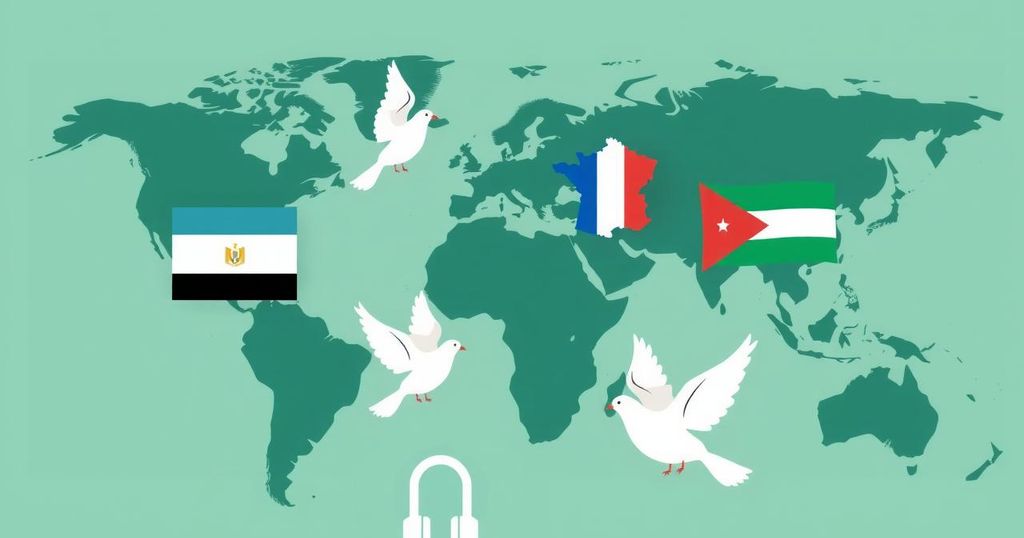Mistreatment of Female Detainees: Eyewitness Accounts from the Trump Era Deportations
The Trump administration’s deportation of over 200 men to El Salvador included eight women who were misled about their destination. Heymar Padilla Moyetones and Scarleth Rodriguez recount their troubling experiences during this process, alleging deception by Immigration and Customs Enforcement (ICE). Their testimonies reveal significant issues in the deportation practices, questioning the administration’s claims of thorough vetting and due process.
On March 15, the Trump administration deported over 200 men to El Salvador, intending to incarcerate them at CECOT prison. However, eight women were also onboard but could not disembark due to El Salvador’s refusal to accept them, leading to their return to U.S. detention. In an exclusive interview, two of these women, Heymar Padilla Moyetones and Scarleth Rodriguez, recounted their troubling experiences during the deportation process, alleging deception by Immigration and Customs Enforcement (ICE) about their destination.
Moyetones, aged 24, expressed her disappointment stating, “We were lied to,” as they were informed they were traveling to Venezuela but realized upon arrival that they were in El Salvador. Trump administration officials maintain that all individuals sent were thoroughly vetted Venezuelans connected to the Tren de Aragua gang, yet the vetting did not consider whether El Salvador would accept female detainees.
The chaotic nature of the operation is further highlighted by a recent acknowledgment from the government about mistakenly deporting Kilmar Abrego Garcia despite a court order against his deportation due to potential gang persecution. The administration’s reliance on tattoos to identify gang members is also criticized as unreliable.
Moyetones and Rodriguez, both now detained in Laredo, Texas, shared their experiences while bonding over their shared ordeal. They firmly state their lack of affiliation with any gangs and express their longing for a better future in the U.S. Moyetones described her aspirations, stating she came to America for a better life for her son, now in the care of relatives. “I am very afraid because I have always looked after my son,” she lamented.
The women’s accounts contrast sharply with the administration’s claims of thorough vetting in the deportations. Senior officials have dismissed the need for judicial reviews prior to deportations and have ignored queries regarding their vetting procedures. Their testimony correlates with an affidavit filed in an ongoing legal case about the legality of deportations without full due process.
Lee Gelernt, ACLU’s lead attorney, criticized the administration’s approach, stating it illustrates a severe lack of due diligence, emphasizing, “Whoever heard of sending someone potentially for a life sentence in El Salvador without giving them any due process?” Despite inquiries, the Department of Homeland Security has refrained from commenting on the ongoing litigation concerning these incidents.
Before the flights, confusion within ICE marked attempts to transfer the women to the airport, consistent with S.Z.F.R.’s affidavit detailing aborted deportation attempts. The women also recounted their experience at the airport, where an immigration official hinted at the gravity of their situation by stating, “You should thank God that you’re not going on that plane.”
Onboarding the planes, the women initially believed they were en route to Venezuela until they landed in El Salvador. During a stop in Guatemala, despite being provided food, they continued to be misled about their destination. Moyetones noted, “We kept asking where we were,” while refusing to open the windows, realizing the true situation only after arriving in El Salvador, observing the aggressive treatment of the men being deported.
Scarleth Rodriguez’s mother expressed her heartbreak over the mix-up, having anticipated her daughter’s arrival in Venezuela. Rodriguez had previously endured hardship and detainment while attempting to cross into the United States, aspiring for a better life. Her mother articulated her struggles, ensuring they could survive no matter what.
In conclusion, the experiences conveyed by Moyetones and Rodriguez reflect significant issues in the Trump administration’s deportation policies. Their narratives illustrate the chaos and lack of due process in the deportation system, emphasizing the personal toll these actions have taken on individuals and families seeking refuge and opportunity in the United States.
The harrowing experiences of Heymar Padilla Moyetones and Scarleth Rodriguez serve as a stark illustration of the chaotic and often unjust nature of the deportation practices employed during the Trump administration. Their accounts highlight not only the administrative errors in deporting individuals without adequate consideration of their circumstances but also underscore the emotional and psychological toll such actions inflict on families. Furthermore, the discrepancies between official statements and lived experiences raise critical questions regarding the integrity of the deportation process and the necessity of judicial oversight to ensure justice and due process.
Original Source: www.nbcnews.com




Post Comment